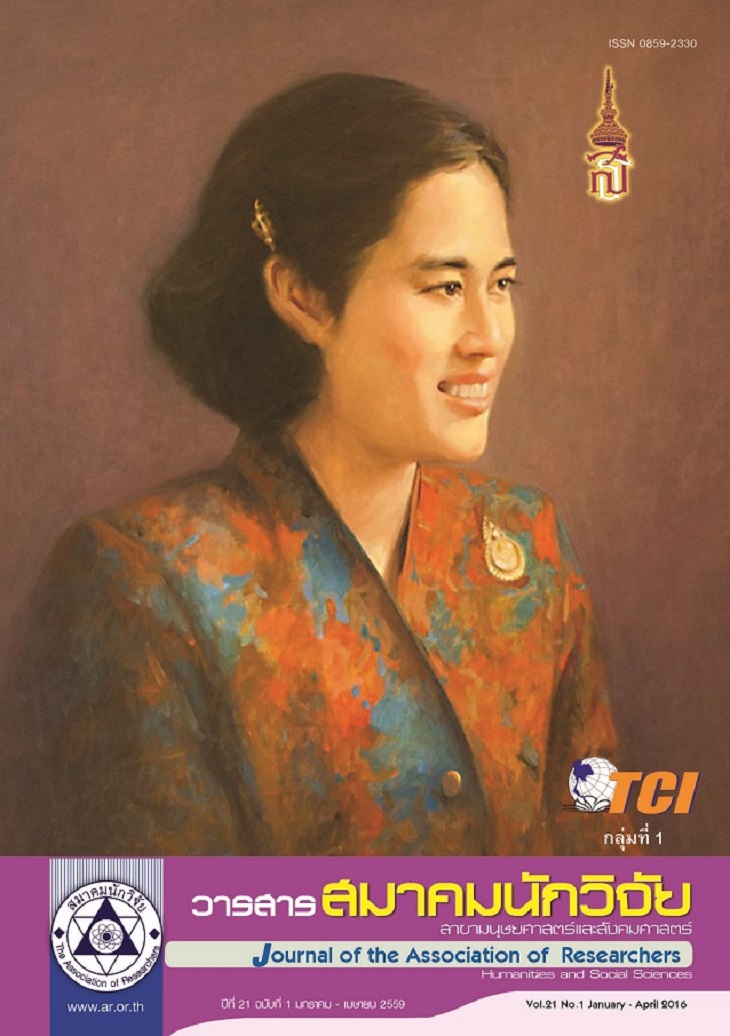The Concept of Sufficiency in Sufficiency Economy
Main Article Content
Abstract
This dissertation has three major purposes: (1) to analyze the evolution of the concept of sufficiency in Sufficiency Economy via academic’s understanding and paradoxes, (2) to analyze the sufficiency image in philosophy, religions, and paradoxes, (3) to proceed analytical interpretation on the meaning of concept sufficiency from the necessary and sufficient conditions to confirm the actual existence in causal and logical ways. The research instrument is philosophizing and logic. The research results found that the conceptual evolution of economic sufficiency has existed since ancient times when society has no sophistication. Later, the complexity of human society was increased and brought the downtrodden in society. In Thailand, His Majesty King Bhumibol Adulyadej, the greatest present king of Thailand, has proposed solution based on the economic, social and environmental factors with sufficiency concept. However, the recognition of human was different; the concept of sufficiency, could be an extrinsic value, conveying to other values, and be subjective. Meanwhile, it could be discovered
that the cognition intrinsic value, which had its own goal, and be objectivity. Moreover, it was Sufficiency Economy that could be the most appropriated approach to prevention paradox. The analysis of sufficiency conception in philosophy and religions was demonstrated that the propensity of
conceptual sufficiency in philosophy was extrinsic valued ideas, which could be conveyed for other values, and be individual subjectivity. Whilst, the analysis of sufficiency conception in religion had propensity to intrinsic value which had its own goal, and be objective. Furthermore, it was found that
both extrinsic and intrinsic values of sufficiency image is paradoxical. From verifying the existence relationship between the concept. Sufficiency and related symbolic logic, it was found that the concept of sufficiency was existed in the form of necessary condition tied together with causality. While the concept of sufficiency in the form of sufficiency in logical condition. It was drawn to the conclusion that the concept of sufficiency was a logical truth
Article Details
บทความที่ปรากฏในวารสารนี้ เป็นความรับผิดชอบของผู้เขียน ซึ่งสมาคมนักวิจัยไม่จำเป็นต้องเห็นด้วยเสมอไป การนำเสนอผลงานวิจัยและบทความในวารสารนี้ไปเผยแพร่สามารถกระทำได้ โดยระบุแหล่งอ้างอิงจาก "วารสารสมาคมนักวิจัย"
References
จวงจื๊อ. (2540). คัมภีร์เต๋าของจวงจื๊อ. แปลและเรียบเรียงโดย ปกรณ์ ลิมปนุสรณ์. กรุงเทพฯ: สำนักพิมพ์เคล็ดไทย.
พระครูสิริปริยัติธํารง (พิสิฐ ชุตินฺธโร). (2554). “ศึกษาวิเคราะห์เปรียบเทียบโภควิภาค 4 กับปรัชญาเศรษฐกิจพอเพียง”,วิทยานิพนธพุทธศาสตรมหาบัณฑิต. มหาวิทยาลัยมหาจุฬาลงกรณราชวิทยาลัย.
พระพรหมบัณฑิต (ประยูร ธมฺมจิตฺโต). พระพุทธศาสนากับปรัชญาเศรษฐกิจพอเพียง [ออนไลน์]. แหล่งที่มา : http://www.mcu.ac.th/site/theme/rector21042557.pdf[1 มกราคม. 2555].
พระมหามิตร ฐิตปญฺโญ. (2547). “ความรู้จักพอประมาณในพระพุทธศาสนาเถรวาทกับหลักเศรษฐกิจพอเพียงในพระราชดำริ”. วิทยานิพนธ์พุทธศาสตรมหาบัณฑิต. มหาวิทยาลัยมหาจุฬาลงกรณราชวิทยาลัย.
มหาวิทยาลัยมหาจุฬาลงกรณราชวิทยาลัย. (2539). พระไตรปิฎกภาษาไทย ฉบับมหาจุฬาลงกรณราชวิทยาลัย. กรุงเทพฯ:มหาจุฬาลงกรณราชวิทยาลัย.
เมตตา ราศรีจันทร์. (2554). “สถาบันกษัตริย์ไทยสมัยใหม่: ศึกษาภาคปฏิบัติการของวาทกรรมเศรษฐกิจพอเพียง”.ภาคนิพนธ์รัฐศาสตรมหาบัณฑิต. คณะรัฐศาสตร์: มหาวิทยาลัยธรรมศาสตร์.
มธุรส ศรีนวรัตน์. ศาสนาเต๋า. วิทยาลัยศาสนศึกษา มหาวิทยาลัยมหิดล [ออนไลน์]. แหล่งที่มา: http://www.crs.mahidol.ac.th/thai/tao00.htm [1 มกราคม. 2555].
วิทย์ วิศทเวทย์. (2549). “ชีวิตที่ดี”. วารสารสมาคมปรัชญาและศาสนาแห่งประเทศไทย. ปีที่ 1 ฉบับที่ 1 มีนาคม2549.
สมภาร พรมทา. (2557). ตรรกวิทยาสัญลักษณ์. กรุงเทพฯ: สำนักพิมพ์วารสารปัญญา.
สำนักราชเลขาธิการ. (2550). พระราชดำรัสเนื่องในวันเฉลิมพระชนมพรรษา 4 ธันวาคม 2541. [ซีดี-รอม]. พระราชดำรัสและพระบรมราโชวาทของพระบาทสมเด็จพระปรมินทรมหาภูมิพลอดุลยเดช พ.ศ.2489 – 2551.
Aristotle, The complete Aristotle: Nicomachean Ethics, Book I .tr. by W. D. Ross, [online]. source: www.free-ebooks.net/ebook/The-Complete-Aristotle/pdf. [1 Aug. 2013].
Augustine Chika Obi. (1993). “Epicurus’ foundation of knowledge”. Doctor of Philosophy, The GraduateSchool of Liberal Arts and Sciences: Duqesne University.
Lao Tzu, The Tao TeChing: A New English Version. tr. by Stephen Mitchell. [online].source:http://www.duhtao.com/translations.html [1 Aug.2013]
Louisa Ilaria Shea. (2003). “Diogenes in the Salon: Cynicism and the Question of Enlightenment”, Doctor of Philosophy, The Department of Comparative Literature: Harvard University.
Marcus Aurelius. (1906). Meditations. tr. by Meric Casaubon. London: J.M. Den and co.
Max Van Manen. (1990). Researching Lived Experience: Human Science for an Action Sensitive Pedagogy, New York: State University of New York Press.
Pierre-Marie Morel. (2006). A Companion to Ancient Philosophy: Epicureanism. Oxford: Blackwell Publishing Ltd.
Plato. (1991). The Republic. tr. by Allan Bloom. Second edition. New York: CoWms Publishers.
Robert Audi. (1995). “Cynics” .The Cambridge Dictionary of Philosophy. 2nd edition. Cambridge: Cambridge University Press.
Ted Honderich. (2005). The Oxford Companion to Philosophy, 2nd Ed. New York: Oxford University Press Inc.
Victor Eugene Emeljanow. (1967). “The Letters of Diogenes”. Doctor of Philosophy, The Department of Classics: Stanford University.
William Wordsworth, Poetry Foundation: Lines Written in Early Spring, [online]. source:http://www.poetryfoundation.org/poem/181415 [12 Aug. 2014]


